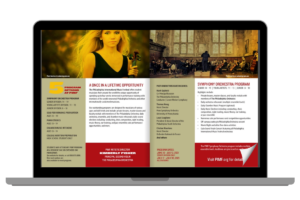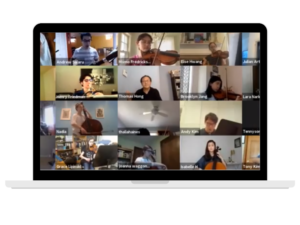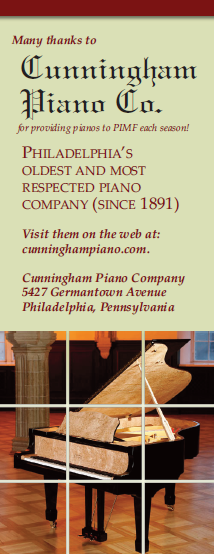Kimberly Fisher / Principal Second Violin / Philadelphia Orchestra
Kimberly Fisher joined The Philadelphia Orchestra in 1992 and has served as principal second violin since 2002. She has appeared as soloist with numerous orchestras including The Philadelphia Orchestra, the Vancouver Symphony, and the Victoria Symphony. As recitalist and chamber musician she has performed across the United States and Canada, and in England, Spain, France, Germany, Japan, China, Vietnam, and Argentina.
Ms. Fisher has appeared in chamber music settings in prestigious venues such as Carnegie Hall, the Mogador Theater in Paris, the Kimmel Center, and the Great Hall of the People in Beijing, and in collaborations with internationally renowned artists such as Wolfgang Sawallisch, Cristoph Eschenbach, Jean-Yves Thibaudet, and many others.
Ms. Fisher has been awarded multiple Canada Council grants and was invited to perform as soloist at the Governor General’s concert in Canada. She has been featured on National Canadian Radio and on Canada’s CBC television. Her teachers included her father, Lawrence Fisher; Yumi Ninomiya-Scott; Aaron Rosand; David Cerone; and Jascha Brodsky.
In 1997 Ms. Fisher co-founded the Philadelphia International Music Festival (PIMF), a highly successful summer music program in residence at Bryn Mawr College, to encourage and inspire musicians of all levels. Originally just for string players, the Festival now includes all symphonic instruments plus piano, and features innovative specialty programs to help students prepare for auditions, improve practice, and address performance issues. PIMF includes students of all ages and all levels who attend from around the world to study privately with musicians of The Philadelphia Orchestra.
Ms. Fisher is an active pedagogue whose students have performed as soloists with major orchestras, attended distinguished music conservatories, performed as members of professional orchestras, and won many awards and competitions. Her energetic, communicative teaching style has led to invitations to present master classes, lessons, and seminars around the world.
Q. What CD are you currently listening to?
Philadelphia Orchestra’s new release of The Rite of Spring and Stokowski Transcriptions of Bach with our amazing Music Director, Yannick Nezet-Seguin on Deutsche Gramaphone.
Q. Other than music, w hat inspires you most?
I love to travel with my family.
Q. Who else in your family is musical?
I come from a musical family. My father, Larry Fisher, was my violin teacher from when I was about 4 years of age until I moved to Philadelphia for college. My mother is an accomplished oboist. My husband is a drummer and percussionist – and both of HIS parents were also professional musicians. Our son, although he is studying psychology, is a song writer and singer.
Q. Who first introduced you to your instrument? What do you remember about the experience?
I think I received a violin for Christmas w hen I w as either 2 or 3. I remember it made me feel happy and special.
Q. What is your all-time favorite piece (to play, to listen to, etc.)?
I have many, many favorite pieces of music, but one that seems to always rise to the very top is Beethoven’s String Quartet No. 13 in B flat major, Op 130. In particular, I love the 5th movement – a slow movement titled “Cavatina”.
Q. What is it that you like most about this piece?
Just thinking about this Cavatina, I feel my heart racing and my breath quickening; not because the music is fast and loud, it isn’t. The emotional content of this music is so powerful, so personal – I cannot fathom how someone (Beethoven) conceived of this. You should definitely check it out. I recommend recordings by the Guarneri Quartet.
Q. What do you most enjoy teaching?
I love the relationships with my students and their families. I am still in very close contact with many students from my private studio in Philadelphia, and many great families around the world who I have gotten to know at PIMF over the years.
Q. What changes would you implement at a grade school level to instill a greater interest in music studies?
I would start introducing kids to music even before grade school. Music has been proven to help children thrive in all areas of life and into adulthood.
Q. Think about those in our society who are the most valued, the most successful, the most influential. What do most of them have in common?
They are CREATIVE; They are DISCIPLINED; They are people with active imaginations who follow through on their ideas.
Q. Is there a better way to describe what studying music develops?
Creativity through discipline and discipline through creativity. Whether it is in a medical setting, in a school, in a high powered legal or financial environment, when raising children, building a house, or finding well-being, problem solving is how humans progress toward goals. And, problem solving is a balance of creativity and discipline.
Although music performance isn’t ultimately for everyone, an introduction to artistic and creative elements of who we are is essential for developing well rounded citizens. I am currently working on a plan of introducing 2 and 3 year olds in preschool to the music in the Suzuki Book 1 repertoire, to be followed up with early Suzuki training from age about 4. The idea is to offer this to underprivileged students who would not be fortunate enough to receive this exposure otherwise.
Q. What is your favorite thing to do when not performing?
Unfortunately for my waistline, I love going to great restaurants. I have a list of restaurants and master chefs around the world whose food I would like to enjoy.




